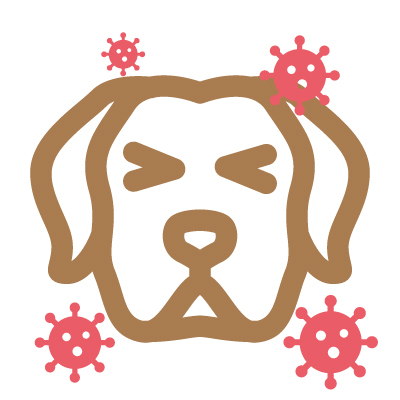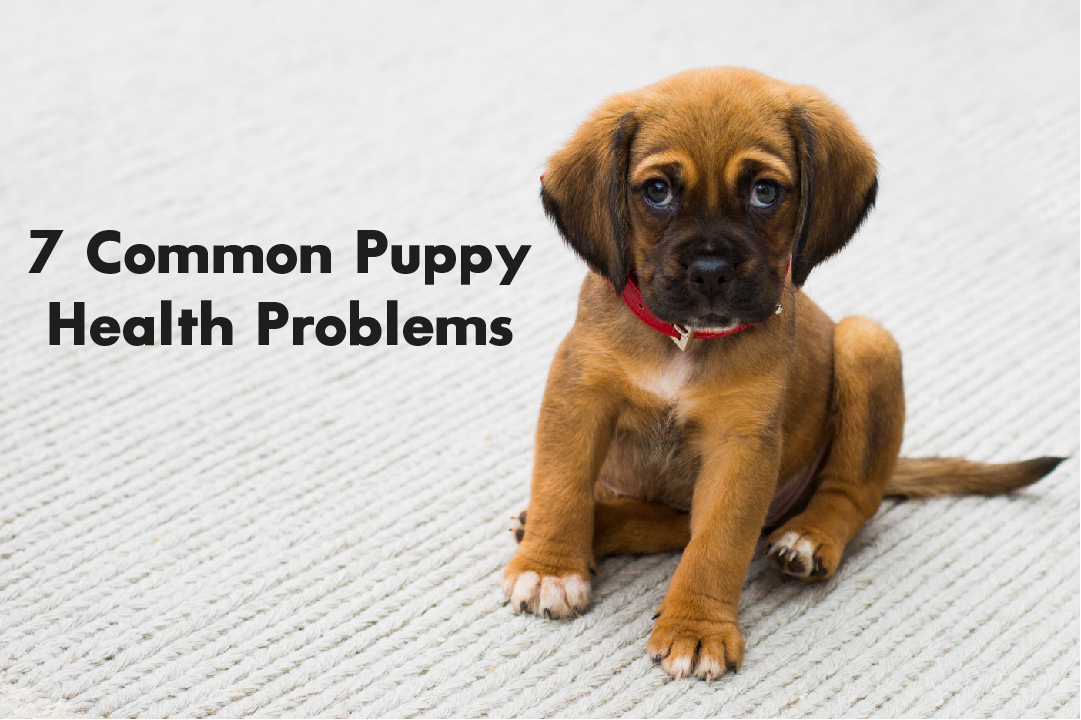As a pet parent, it is undeniably an exciting and joyful experience bringing home your new pup! So we do all that we can to provide them with the best care to keep them healthy. Nonetheless, worrisome health conditions can still arise in our little ones during puppyhood. Most of the time, they are passing issues that can be dealt with at home, but other times they require more intense treatment from a veterinarian. Therefore, it is good to be aware of some of the common health issues that your new pup may experience so you know what you are dealing with to seek out the best course of action for your furkid.

Vomiting and diarrhoea is a very common problem among puppies
Diarrhoea/Vomiting
These are the most common occurrences seen in puppies by far. Intestinal parasites are usually the primary cause, and can easily be treated and prevented with a dewormer. Another cause could be from indiscriminate eating or ingesting unsuitable food sources. Puppies are notorious for licking and chewing anything they find of interest as they explore with their mouths, but this can often result in diarrhoea and/or vomiting. This is due to their lack of developing gastrointestinal tract which is still very sensitive. If this is the case, your pup should recover quickly within 12-24 hours. If diarrhoea/vomiting goes beyond that, it may indicate a more serious issue and having your puppy checked by a trusted veterinarian is crucial. To avoid this, puppy-proofing your home or limiting your pup’s roaming space to a playpen for easy monitoring is recommended.
Puppy Pyoderma
Like children, puppies are in the growing stage and have sensitive skins. This puts them at risk for all sorts of skin issues. Puppy pyoderma, in particular, is one of the most commonly observed skin conditions. It is triggered by environmental factors which cause bacteria on your puppy’s skin, which are harmless but may result in an infection. It typically affects areas with less fur such as the belly and groin area and shows up as reddish bumps or small lesions. Topical antiseptics can be used to treat puppy pyoderma in mild cases, while more serious cases would require prescribed oral antibiotics. The good news about pyoderma is that they are not infectious and usually clears up quickly if given the right treatment. You can prevent your puppy from getting pyoderma by ensuring that sensitive areas are kept clean and dry. Regularly sanitizing your puppy’s sleeping and play area can also be helpful.
Hypoglycemia
This is simply a condition when the sugar level in your pup’s bloodstream gets too low from not eating for long periods at a time or from intestinal parasites that could interfere with their digestion. It tends to affect puppies, particularly smaller breeds as they have a higher metabolic rate and lower caloric reserve than larger breeds. Puppies will usually exhibit symptoms, such as lethargy and incoordination, and should be given sugar water or an oral concentrated solution of glucose as soon as possible. If not given proper treatment, their condition can spiral into seizures or loss of consciousness. To avoid hypoglycemia, it is recommended that your puppy is eating regular meals and kept warm.
Hernias
This condition is when your puppy’s abdominal contents push through a weak spot in the muscle or fatty tissues. The most common type of hernia seen in puppies is an umbilical hernia. Other types of hernias include inguinal, diaphragmatic, perineal, and hiatal. Oftentimes, hernia cases are congenital (born with it) or from trauma. The severity will depend on where the hernia has developed in your puppy. Fortunately, hernias are treatable and can be corrected through surgery. You mustn’t delay treatment for your puppy to avoid further complications.

Many diseases like parvovirus are very deadly to puppies
Communicable Diseases
Not an exhaustive list, but these diseases include parvovirus, distemper, leptospirosis, and rabies, which can all be life-threatening if your puppy is not vaccinated against them. They can be easily spread if your puppy is exposed to an infected animal. Contaminated objects or surfaces in the environment where the infected animal has been in contact can also be a cause of transmission. Therefore, it is crucial that your puppy is vaccinated starting at around 6 weeks of age, and repeated every 3-4 weeks up to 16 weeks for full protection. Ensure that your pup’s vaccinations are completed before exposing them to the outdoors and other animals.
Kennel Caugh
Comparable to the common cold in humans, this highly infectious disease is caused by bacteria and viruses that affect your dog’s respiratory tract. It gets its name from high-risk areas of transmission, such as kennels, shelters and boarding facilities, that often have animals kept in close contact with each other. However, your pup can still end up with kennel cough without being at any of these places. Kennel cough is airborne and can be transmitted through contaminated objects and surfaces or direct contact with an infected animal. Therefore, getting your puppy vaccinated against kennel cough is recommended especially if your puppy has regular contact with other dogs at public places like grooming salons, boarding kennels, and dog parks. When your puppy catches this disease, it will usually exhibit symptoms of persistent hacking coughs, lethargy, fever, sneezing, and a decrease in appetite. Though most mild cases can go away on their own within a week or two, stubborn cases will require longer recovery periods.

Sometimes, baby teeth just won’t come out by themselves
Retained Deciduous (Baby) Teeth
Most often seen in small and brachiocephalic breeds, but it can also occur in larger breeds. The commonly retained tooth is the canine tooth, but any baby teeth can be persistent as well. When this happens, the retained tooth will occupy the place meant for the permanent tooth, forcing it to grow in an abnormal position in the gum. This results in crowding or malocclusion of the teeth, which will eventually lead to oral diseases and an abnormal bite. Therefore, it is important to regularly do an oral inspection of your pup’s mouth for any abnormalities during their teething stage. If you notice your pup’s baby teeth have not fallen out around 6-7 months, at which all adult teeth should be present, then it is best to schedule an appointment with your veterinarian for tooth extraction. Early extraction will allow permanent teeth to move back into their initial positions.
When Is A Vet Visit Needed?
Most cases discussed above can be easily prevented, but there will still be times when your puppy may encounter one or more of them. With that said, now that you know what are the common conditions that your puppy may face during its puppyhood, you can carry out the necessary steps to prevent them where possible.
When it comes to young animals, it’s important to understand that they are much more sensitive and fragile as they grow with a weaker immunity system. Hence, we should get them to the vet as soon as possible if symptoms persist after 12-24 hours. Early detection always results in a better prognosis. Ultimately, regular health checkups for puppies are encouraged, and even when they surpass puppyhood. Ensuring that your pup is up to date with their vaccinations and preventive care will keep them healthy in the long run too!

